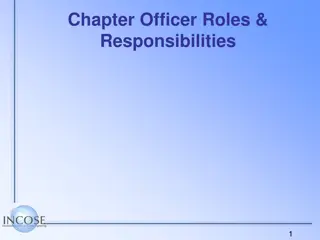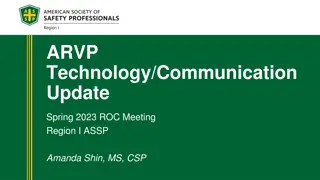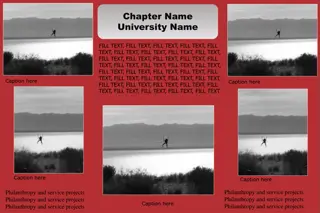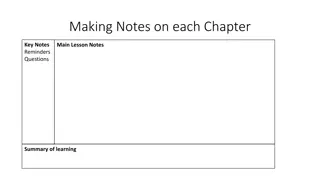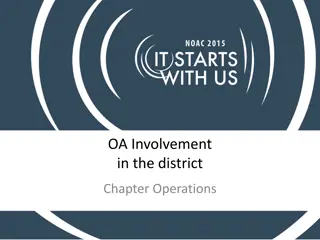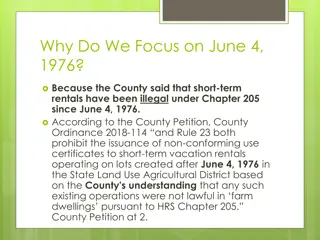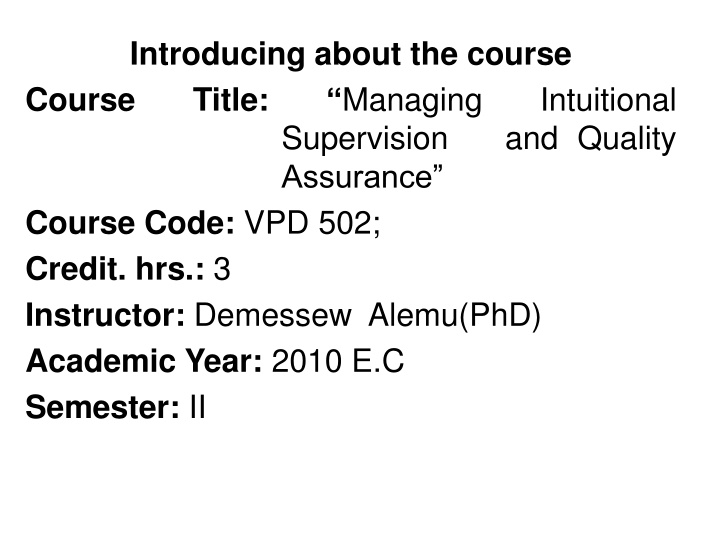
Institutional Supervision and Quality Management
Learn about supervision in the context of institutional quality management, where supervisors play a crucial role in overseeing operations to enhance service or production quality. Gain insights into the responsibilities, nature, and scope of supervisors within organizations, emphasizing collaboration and improvement rather than control.
Download Presentation

Please find below an Image/Link to download the presentation.
The content on the website is provided AS IS for your information and personal use only. It may not be sold, licensed, or shared on other websites without obtaining consent from the author. If you encounter any issues during the download, it is possible that the publisher has removed the file from their server.
You are allowed to download the files provided on this website for personal or commercial use, subject to the condition that they are used lawfully. All files are the property of their respective owners.
The content on the website is provided AS IS for your information and personal use only. It may not be sold, licensed, or shared on other websites without obtaining consent from the author.
E N D
Presentation Transcript
Introducing about the course Course Title: Supervision Assurance Course Code: VPD 502; Credit. hrs.: 3 Instructor: Demessew Alemu(PhD) Academic Year: 2010 E.C Semester: II Managing Intuitional and Quality
Introduction takes Supervision providers and production industries. It is done with the sole aim of improving service or production. It is a continuous activity that is supposed to be done regularly. It requires expert experiences . It needs the exertion of other people s effort in an organization. When we do supervision, we watch over an activity or task being somebody and ensure that it is performed correctly. place in all service knowledge and carried out by
Who are supervisors? As part of an organization s management team, they oversee the work of operative employees and are the only managers who don t manage managers. Today s supervisors can be describe as a trainer, adviser, mentor, coach. The supervisor s job is unique in that it bridges the management ranks with the operating employees. Supervisors have organizations. facilitator or much influence on
1-Institutional supervision At times terms like; evaluation, rating, assessment, and appraisal are used to describe what supervisors do, yet none of them accurately reflect the process of supervision of instruction /institute. Teachers/employees view supervisors as people in the bureaucratic designed to watch and control actions. But they are professional people who are supposed to support teachers/employees structure
Industrial overseeing, workers. But supervision in institutes is considered as a collaborative effort. For instance, it makes designed to improve the learning-teaching process. The purpose of supervision is neither to make judgments about the competence of teachers/workers nor to control them but rather to work cooperatively with them. supervision directing, focuses and on controlling a set of activities
1.1 The nature and scope of institutional supervision Supervision helps to increase production/ quality of instruction Supervision is a management and labor. supervision can be explained by action rather than by words. supervision can be defined as the function of leading, coordinating, and directing the work of others to accomplish designated objectives. vital tool for both
Supervision can be defined as a major activating function which ensures that plans are understood and are being followed. Supervision is also viewed as working with people and as the initial contact between management and the workers. Supervision is essentially a management function-the function management where trust and accountability are characteristics of the position. of the first line-
Levels in the organizational pyramid Top management Middle Mangers Supervisors Operative Employees
Basic supervision Supervision organization s goals are achieved. Supervision ensures that employees are performing their jobs contribute a share to the accomplishment of organization s goals. Supervision focuses on daily problems and goals of an organization points to be consider in always see that the so that they
What are supervisory competences? Katz(1974) and others have found that successful supervisors must posses four critical competences: interpersonal, conceptual and decision making competences. What is technical competence? It is the ability to knowledge or expertise. What each worker does is part of every supervisor s job. Example, scheduling work. technical, apply specialized the task of
What is interpersonal competence? The ability to work well with people, understand their needs, communicate well and motivate others-both individually and in groups. What is conceptual competence? It is the mental ability to analyze and diagnose complex situations. It allows the supervisor to see that the organization is a complex system of many interrelated parts and that the organization itself is part of a larger system that includes; industry, the community, and the nation s economy
What is decision making competence? It is the supervisor s ability to enhance his power, build a power base, and establish the right connections in the organization. General functions of the supervisor Planning: Defining/setting organization s goals by establishing strategy for achieving the goals. Organizing: Arranging and grouping jobs, allocating resources, and assigning work so that plans will be accomplished. system for
Staffing: Assign workers in the organization to accomplish the plan. Leading: Motivating employees, directing activities of others, effective communication resolving conflicts among members. Controlling: Monitoring an organization s performance and comparing performance with previously set deviations exist getting the organization back on track. selecting the most and channel goals. If significant
Remember that each function depends on the preceding function. Most of the time is spent leading and supervisor. 1.2. Purposes of Institutional supervision A/ For the institution Support and developing favorable setting for teaching and learning. To maintain high standards of schools in accordance with the rules and regulations set. controlling by the
Improve teaching methods and techniques, Utilize newly discovered principles of (group dynamics) group behavior, especially the interactions that occur among persons. Utilize community resources and evaluate their contribution for teaching. Ensuring that discipline is maintained in the school. B/ For the teachers Help teachers to learn what their problems are and to seek the best methods of solving them.
Ensuring affectively. Ensuring that new teachers receive training to enable them function effectively on the job. Providing professional teachers. Guiding teachers instructional materials. Providing technical assistance to teacher when required. that teachers do their work information to to the sources of
Maintaining teachers. Suggesting performance. Providing opportunities to discover teachers with special abilities or qualities. In general, supervision plays a role of; administrative, educational and supportive role. high morale among the ways of improving teacher
1.3. The basic principles of institutional supervision includes Purposiveness-to determine at the very beginning its purpose. Plan-it must be planned. Diversity-it should diversification. Dialectical Relation-it should provide a feedback both to the teachers as well as to the supervisor. give room for the
conduct-supervisor should Code ensure that he/she appears professionally responsible. Principles of environment-the should be conducive for effective teaching- learning activities. Principle of adequate information for teachers/employees-a staff needs to organization/school in detail. of safe school & healthy environment newly recruited about know the
guidance-the supervisor Principle should guide job bearers on how, what, where and when to carry out their duties. Principle of effort reward-recognition and reward for good work done when carried out promptly and publicly serves as morale activator for other staff. Principle of constructive comments should be provided constructively and privately by recognizing the good work. of recognition and criticism-
Principle of liberality(broad mindedness)- opportunities should subordinates to aspire to leadership position. Principle of encouragement-the supervisor should provide encouragement to the staff. Principle of networking-a good supervisor develops team spirit and networks with other supervisors. Principle of objectivity-both internal and external supervisors should be objective in their sense of judgment and decision making process. be created for all
Principle of tack (course of action)- diplomacy is needed in dealing with people. Open confrontation should be avoided as much as possible. 1.4. Institutional supervisor s roles and responsibilities He/she is responsible for coordinating all the resources of his/her achieve a set goal. He/she also has motivate and communicate, control and evaluate, and develop the people in his/her workgroup. workgroup to to organize, direct,
He/she is responsible for the maintenance of quality standards; the protection and care of materials; and the services to be rendered to those under his/her control. He/she is also; Leader and trainer of his/her employees Implementer of ideas Co-worker with other supervisors Subordinate to his/her own boss Mediator of employee needs
In schools, supervisors are expected to perform the following duties; Helping the teacher to identify new skills Should show good leadership style Cooperate with staff and students Support groups or individuals Report back to the boss Conduct meeting with staff frequently
Qualities of a Successful Supervisor Bring a positive attitude to the workplace. Be loyal to the organization Show fairness Develop good communication skills Be able to delegate and give up control. Accept the challenge and take hold of the opportunity for success
1.5.Types of institutional includes supervision supervision-this carried is by an a external group Full inspection inspectors from the Ministry or other bodies to examine subjects taught in a school, scheme of work, lesson notes, classroom management and other physical facilities. Emergency supervision-this refers to the kind of inspection carried out as a result of crisis in a school setting. out of
Sample and survey visit-this supervision is meant to survey an aspect of educational performance in the schools, for instance student attitude in certain subjects. Clinical supervision-this is the type of supervision in which supervisors meet with the teaching staff with the aim of developing their professionalism method. Routine supervision-this is the periodic visitation of schools by a supervisor or a group of supervisors to a school. and instructional
Investigative supervision-this type of visit is usually carried out with the sole purpose of addressing a particular problem in the school. Special visit-this type of visit deals with special cases which are also specific in nature. Pre-opening of school visits-these visits are made to a location established school approval to provide educational services. of seeking a newly that is for
Assessment visit-this type of visit lasts longer than a routine visit. This visit involves looking into the various school activities and how these activities are organized and carried out. Follow-up visit-this takes place after a full inspection would have been carried out in school during the visit. Classification of school supervision Instructional supervision-this borders on the activities which are carried out with the purpose of making the teaching and learning activities better
Administrative supervision-this deals with the mobilization and motivation of the staff in the school towards effective performance of their duties and responsibilities. 1.6. Task(assignment) areas of institutional supervision Developing curriculum-this has to do with the designing or redesigning of that which is to be taught, by whom, when, where, how and in what pattern. Organizing instruction-this is the making of an arrangement whereby student- teacher space and materials are related
Providing staff-this has to do with assuring the availability of instructional staff members in adequate numbers and with appropriate competencies for facilitating instruction. Providing facilities-this deals with the designing or re-designing and equipping facilities for instruction. Providing materials-this selecting and obtaining appropriate materials for use in implementing curricular design. Arranging for in-service education: this involves planning and implementing learning borders on
experience that will improve the performance of staff in instruction-related ways. Staff members orientation-this is providing staff members with basic information necessary to carry out assigned responsibilities. Relating special means arranging for careful coordination of services to students to ensure optimum support for the teaching-learning process. Developing public providing for a free flow of information on matters of instruction to and from the public. service-this students relation-this means
instruction-this organizing for data and decision means Evaluating planning, procedures interpretation improvement of instruction. and gathering, implementing analysis making for

